| |
 |
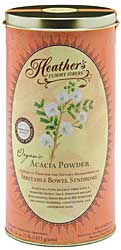
Tummy Fiber For IBS!
Certified Organic
Acacia Senegal
Tummy Fiber
The prebiotic 100% soluble fiber that relieves both diarrhea and constipation!
In this Issue...
Food & Recipes
Rx News & Research
Ask Heather ~ Gallbaldder Removal & IBS
About Us
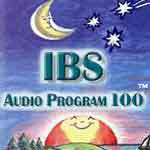
Gut-directed hypnosis is one of the most effective ways to help relieve all IBS symptoms! Results can last more than 5 years.


Fennel Tummy Tea for
IBS Bloating & Gas
Fennel has anti-spasmodic properties and it stimulates the production of gastric juices. Fennel tea is the best for relieving bloating and gas!
Did you miss the latest
IBS newsletter and
Halibut with Herb Sauce?
Past issues
are posted here!
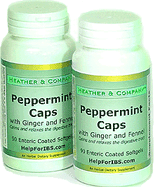
Try Peppermint Caps
Peppermint Caps are the best for abdominal spasms, cramps and pain!
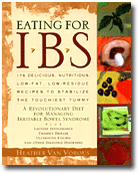
Delicious Recipes
for IBS!
Learn how to eat well and feel better

The IBS Starter Kit!
Learn every way possible to successfully manage your symptoms!
With the First Year: IBS, an essential guide, plus Eating for IBS, plus Acacia Tummy Fiber to start stabilizing immediately!
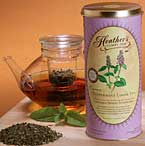
Try Heather's
Peppermint Tummy Tea
Peppermint is a smooth muscle relaxant and has pain-killing properties. Our tea is large leaf with a high volatile oil content - much stronger than tea bags!
|
 |
|
| |

Did your email mangle this newsletter? Copy and paste this address into your browser window:
http://www.helpforibs.com/news/newsletter/limemint072704.html or click here to see it online.
July 27, 2004
This week ~ Gallbladder Removal & IBS
Hello to everyone -
This week we beat the summer heat most deliciously, with a light and refreshing lime mint sorbet. This recipe is a wonderful example of how to use desserts to sneak in healthy fruits and fresh herbs, something that's easy to do after you've had a high soluble fiber meal (plus the sorbet just plain tastes terrific!) We've got a special section for people who developed IBS after having their gallbladders removed - and if that's you, you may be surprised to learn that you might not even have IBS after all. As always, we also have a wealth of new digestive health research findings. Enjoy!
Best Wishes,
Heather Van Vorous
Note: Did a friend send you this newsletter? Sign up here for your own free subscription.

Fresh Mint Leaf and Lime Sorbet
Makes 6-8 Servings (about 1 quart)
2 cups water
2 cups granulated sugar
3 cups packed fresh mint leaves, washed, dried, and chopped
1 cup fresh lime juice
1 tablespoon grated lime zest
2 organic egg whites*
Make a mint syrup by combining mint leaves, sugar, and water in a small saucepan or microwave-safe bowl. Heat and stir until sugar dissolves, bring to a boil and simmer 2 minutes. Chill. Strain syrup, pressing hard on solids and discarding mint leaves. Add syrup and remaining ingredients in blender, mixing well on high speed. Freeze in ice cream maker according to manufacturer's instructions.
*If salmonella is a concern in your area you can substitute pasteurized egg whites, available in the dairy section of most grocery stores (Egg Beaters, etc.).
For oodles of other delicious recipes, come visit the IBS Recipe Exchange board!
Are you just learning how to eat for IBS? A little intimidated at the thought of special IBS recipes? Not quite sure just what makes these recipes special in the first place? Don't worry! Come see
the IBS Diet pages, and find the answers to all your questions.
 Visceral Sensitivity Index: a GI Symptom-Specific Anxiety Scale
Visceral Sensitivity Index: a GI Symptom-Specific Anxiety Scale
Anxiety related to gastrointestinal sensations, symptoms or the contexts in which these may occur is thought to play a significant role in the pathophysiology as well as in the health outcomes of patients with irritable bowel syndrome. Study Aim: To develop a valid and reliable psychometric instrument that measures gastrointestinal symptom-specific anxiety. Methods: External and internal expert panels as well as a patient focus group evaluated a large pool of potential item stems gathered from the psychological and gastrointestinal literature. Potential scale items were then administered to 96 patients diagnosed with irritable bowel syndrome along with a set of validating questionnaires. Final item selection was based upon rigorous empirical criteria and the psychometric properties of the final scale were examined. Results: A final unidimensional 15-item scale, the Visceral Sensitivity Index, demonstrated excellent reliability as well as good content, convergent, divergent and predictive validity. Conclusions: The findings suggest that the Visceral Sensitivity Index is a reliable, valid measure of gastrointestinal symptom-specific anxiety that may be useful for clinical assessment, treatment outcome studies, and mechanistic studies of the role of symptom-related anxiety in patients with irritable bowel syndrome.
Check here for more
information...
Check here for information about
reducing anxiety-related IBS with clinically researched hypnotherapy.
Bacillary Dysentery as a Factor of IBS and its Pathogenesis
The incidence of irritable bowel syndrome (IBS) or functional bowel disorders (FBD) after bacillary dysentery (BD) has not been extensively evaluated, and little is known of the pathogenesis of post-infective (PI) IBS. Therefore, we investigated the incidence of IBS and FBD in a patient population who had recovered from BD. To further elucidate its pathogenesis, neuroimmunological changes, including interleukins (IL), mast cells, neuropeptides, and the relationship between mast cells and intestinal nerves, were investigated. Conclusions: BD is a causative factor in PI-IBS. The immune and nervous system may both play important roles in the pathogenesis of PI-IBS.
Check here for more
information...
Alpha-Linoleic Acid in Walnuts Good for Cardiovascular Health
Walnuts are one of the most nutritious whole food sources of alpha-linolenic acid (ALA), an essential omega-3 fatty acid. Walnut consumption has been proven to significantly lower total
cholesterol levels as well as LDL or "bad" cholesterol levels. Recently-published research also shows including walnuts in the diet can improve vascular function, which can aid in the prevention of heart disease and stroke.
Check here for more
information...
Looking for IBS-safe ways to eat walnuts? Check here to learn about
Eating for IBS, the dietary guide and cookbook just for Irritable Bowel Syndrome.
IBS Remains a Difficult Condition to Manage
Irritable bowel syndrome (IBS) remains challenging to manage, with no universally agreed treatment protocol. Complicating the treatment picture is the placebo response, which can vary from 20% to 70% and can be sustained long term. Results of the most recent meta-analysis on fiber intake suggest that soluble fiber (psyllium, ispaghula, and calcium polycarbophil) is of benefit in alleviating IBS symptoms, while insoluble fiber (corn and wheat bran) is not. A meta-analysis of antispasmodic agents suggests that the use of this class of drugs improves global symptoms in IBS and reduces abdominal pain, but the anticholinergic drugs available in the United States have limited efficacy. Opioid agonists are effective antidiarrheal agents; loperamide is superior to placebo for IBS-associated diarrhea but not other symptoms. Meta-analyses support the efficacy of tricyclic antidepressants, but the efficacy of the selective serotonin reuptake inhibitors is unclear. Tegaserod is efficacious in constipation-predominant IBS in women. Alosetron is efficacious in women with diarrhea-predominant IBS, but side effects limit its use. A number of newer agents are being tested, but which of these will reach the clinical setting remains uncertain.
Check here for more
information...
Intolerance in Dyspepsia or IBS: Organ Specific or Pan-Intestinal?
Functional gastrointestinal disorders (FGID) are characterized by visceral hypersensitivity that could be specific to a region of the gut or reflect a diffuse pan-intestinal disorder. Sensory thresholds to distension at two visceral sites in patients with different FGIDs were determined. According to Rome II criteria, 30 patients from three groups were studied: patients with (i) functional dyspepsia (FD) or (ii) irritable bowel syndrome (IBS), and (iii) patients with concomitant symptoms of FD and IBS. Pain thresholds to balloon distension were determined in stomach and rectum. In FD patients, gastric intolerance to balloon distension was found in 91% patients; rectal hypersensitivity was documented in 18% patients. In IBS patients, rectal hypersensitivity was seen in 75% patients; while gastric hypersensitivity was never found. In patients with concomitant symptoms of FD + IBS, gastric and rectal intolerance to distension were present respectively in 82 and 91% patients. In the whole group, visceral intolerance to distension was documented at one site in 90% patients and at both sites, i.e. stomach and rectum, in 33% patients. Visceral intolerance to distension can be pan-intestinal in patients with multiple sites of symptoms, but appears organ-specific in patients exhibiting a specific site of symptoms.
Check here for more
information...
Soy Cuts Risk of Endometrial Cancer
Regular intake of soyfoods is associated with a reduced risk of endometrial cancer, finds a large study of Chinese women published in the British Medical Journal. Thought to be one of the largest studies into the association between soy and endometrial cancer, the researchers from the Shanghai Cancer Institute and Vanderbilt University in the US report an inverse dose-response relation between intake of soya food and risk of the disease, which affects the lining of the womb. They also found that the association was more pronounced among women with a higher body mass index or a higher waist:hip ratio. Endometrial cancer is the fifth most common cancer among women worldwide - around 7,090 American women will die of the disease in 2004 - but incidence
of the cancer varies more than 10-fold worldwide.
Check here for more
information...
Looking to increase your soy intake? Check here for
hundreds of IBS-friendly recipes!
Looking for the latest IBS research and news?
Check out the IBS Research Library!
 Gallbladder Removal and IBS
Gallbladder Removal and IBS
"I've had chronic diarrhea ever since I had my gallbladder removed three years ago. My doctor says I must have developed IBS, and that the timing is just a coincidence. Is it?"
No - it's almost certainly not a coincidence, and frankly your doctor should know this. One of two scenarios is likely here: 1) you don't actually have IBS at all, but chronic diarrhea stemming from the effects of the gallbladder removal itself; 2) the gallbladder surgery traumatized the enteric nervous system of your gut and led directly to your development of IBS. Let's take each of the possibilities (neither one a happy outcome, I'm sorry to say) in turn.
If your symptoms are constant and urgent diarrhea, particularly without abdominal pain, and began immediately after you had your gallbladder or ileum (the last portion of the small intestine) removed, you could be suffering from a malabsorption of bile acids secreted by the liver. These acids, which are normally stored in the gallbladder, are now instead being dumped directly into the small intestines, causing chronic irritation and thus chronic diarrhea. This is a fairly common outcome following gallbladder surgery, though unfortunately it doesn't seem to be a side effect that patients are warned about in advance, nor do all GI doctors seem to be aware of the cause-and-effect that's at play here.
If your diarrhea does stem from bile acid malabsorption, a prescription drug such as Questran (generic name cholestyramine), which binds the bile acids in the intestines and prevents them from reaching the colon, can help this problem and should resolve your diarrhea quite quickly and effectively. The bad news is you'll probably have to take the drug for the rest of your life. The good news is you don't have IBS. As an aside, though, you'll probably find it helpful to follow the low fat, high soluble fiber guidelines of the IBS diet, as fat stimulates bile production and that can exacerbate your diarrhea, while soluble fiber helps absorb and bind bile in the GI tract and aids in its removal from the body.
On the other hand, it's also a very reasonable possibility that the abdominal surgery itself did in fact lead to the development of IBS. Your body may have no problems adjusting to your missing gallbladder or bile acid malabsorption; instead, you might now have a dysfunction of your gut's nervous system. Though no one clearly understands precisely what causes someone to develp IBS, there is mounting evidence that for some people the condition is precipitated by some type of grievous insult to the gut - dysentery, food poisoning, intestinal flu, abdominal surgery, or even pregnancy. Surgical removal of your gallbladder would certainly qualify as an insult to your gut.
This theory goes that even after full physical recovery from the traumatic event to your GI tract, the nerves within the gut retain a "memory" of the insult and remain hyper-sensitive to further stimulation, as well as prone to subsequent over-reaction. So, even though you may have recovered completely from the actual gallbladder removal and abdominal surgery, you could now be left with a permanently malfunctioning enteric nervous system, in the form of Irritable Bowel Syndrome.
If you've really been unfortunate, you could actually be suffering from both problems: bile malabsorption and IBS. There is a bright side, though, as a drug like Questran will seriously minimize the diarrhea you have from the bile acid irritation. And, the many different lifestyle management strategies for IBS will help tremendously to get your other symptoms under control. You're probably at the worst point of the problem right now if you're just learning about what actually happened to you - from here on out, things should only get better!
One of the most popular previous IBS Newsletter columns was the Seven Sneaky Deadly Sins of the IBS Diet. Wondering what they all are? Check here...
1. Coffee (yes, decaf counts)
2. Yogurt (it's the safest dairy product for IBS...isn't it?)
3. Alcohol (just one glass of wine is okay, right?)
4. Vitamin supplements (they're good for you, aren't they?)
5. No insoluble fiber foods (they're triggers, so you just don't eat them, right?)
6. Too low a dosage of soluble fiber supplements
7. Not drinking enough water (doesn't soda pop count?)
 Heather & Company for IBS, LLC is dedicated to serving people with Irritable Bowel Syndrome. Our mission is to provide education, support, and products that allow people with IBS to successfully manage their symptoms through lifestyle modifications.
Heather & Company for IBS, LLC is dedicated to serving people with Irritable Bowel Syndrome. Our mission is to provide education, support, and products that allow people with IBS to successfully manage their symptoms through lifestyle modifications.
We offer extensive information and tangible help for IBS, including the world's best-selling and best-reviewed books for the disorder. We provide the internet's top IBS web site resources; a twice-monthly IBS Newsletter; seminars and classes; dietary brochures for patient distribution by health care professionals; an IBS Research Library; and Heather Cooks!, a healthy cooking show on Seattle television. Much of our work is based on Heather's development of the first and only comprehensive IBS dietary guidelines and recipes, an achievement which has earned numerous awards and accolades as well as thousands of thank you letters from IBS sufferers.
Heather & Company also provides the only patient-expert moderated IBS Message Boards on the internet with forums for diet, recipes, hypnotherapy, yoga, plus Crohn's and Colitis. In addition, we support and coordinate the formation and continuation of local in-person IBS support groups across the USA, Canada, the UK, Australia, and New Zealand. We will soon have other IBS services and products available.
Our website receives over 2.5 million visits each year, and our newsletter is sent to over 24,000 people. We are regular exhibitors at the Digestive Disease Week and American Dietetic Association conferences.
Sponsorship opportunities are available for the message boards and this newsletter for companies and/or products that have been legitimately established as helpful for digestive disorders.
Please contact us for information.

You are receiving this email because you have expressed interest in IBS news and information.
To unsubscribe from Heather's IBS Newsletter, click here http://www.helpforibs.com/news/unsub.asp or send an email to heather@helpforibs.com.
If you are viewing this newsletter on a website and would like to subscribe for email delivery, please "Join the IBS Newsletter" here.
ANTI-SPAM PRIVACY POLICY
LEGAL DISCLAIMER - This email is not intended to replace the services of a physician, nor does it constitute a doctor-patient relationship. Any application of the recommendations in this email is at the reader's discretion. Heather Van Vorous and Heather & Company for IBS, LLC are not liable for any direct or indirect claim, loss or damage resulting from use of this email and/or any web site(s) linked to/from it. Readers should consult their own physicians concerning the recommendations in this email.
Heather & Company for IBS, LLC
409 10th Avenue East Suite 202
Seattle, WA 98102 USA
© 2004 Heather & Company for IBS, LLC. All rights reserved.
|
|
|
|

